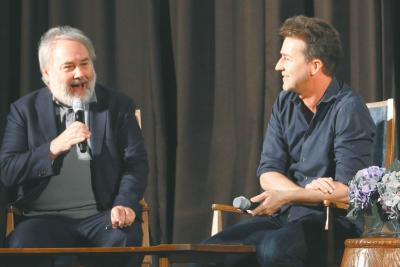Ed Norton: Shape-Shifting, Style, Stella, and ‘The Score’

The conversation at the East Hampton Middle School between the actor Edward Norton, the recipient of the 2016 Hamptons International Film Festival’s Career Achievement Award, and David Edelstein, the chief film critic for New York magazine, began auspiciously. Mr. Edelstein, referring to Mr. Norton’s inspiration for Mike Shiner, his self-involved character in the Academy Award-winning “Birdman,” asked, “Where do you go to find the ultimate narcissistic actor?”
Mr. Norton’s deadpan reply: “There are more of these in the profession than you might think.” After the laughter subsided, he went on to discuss the film. “I can’t give enough credit to Alejandro Inarritu and his writing partners. So much of what was in that film was actually fully realized and articulated in the script. That character was so well defined and so fully realized that it was a real gift.”
The actor’s sharp intelligence, insight into the profession, and sense of humor were fully on display Sunday throughout the festival’s A Conversation With c program. Mr. Edelstein mentioned performers who “shape the room so it all circles around them,” to which the actor replied, “Yeah, alcohol has a lot to do with it, too, in many cases.”
Turning serious, Mr. Norton said, “I’ve always felt there are some actors who are iconically larger than life and there are some who are more subtle shape-shifters, who are hiding or not even using their own essence in the work. I’ve always been riveted by the ones who are naturally iconic.” Though reluctant to situate himself between the two poles, he cited Harrison Ford, Morgan Freeman, Tom Hanks, James Stewart, and Cary Grant as actors with “a certain gravitational center.”
“It’s impossible to imitate Cary Grant,” he said. “Who’s more iconic than Cary Grant? He was also a great actor, but you don’t see him transforming himself in a chameleonic way. I mean, I don’t think he had a different haircut in a single film in his career.” He went on to mention Daniel Day Lewis as an actor at the opposite end of the spectrum, “the type of actor who disappears into every role.”
Any extended conversation about acting will ultimately lead to Marlon Brando. Mr. Norton worked with Brando and Robert de Niro on the heist film “The Score” in 2001. “I’m not sure I’d have done that particular film absent those two guys being in it,” he said. “You do that just for the experience — and to own the poster later with your name next to theirs.”
Mr. Norton knew Brando before making that film. “He was really an incredibly poetic and funny guy, sad and tormented in a lot of ways, but he had a very nimble mind. I loved watching the way he went about trying to keep it fresh for himself.”
When the conversation turned to Method acting, Mr. Norton noted that it had been somewhat inaccurately ascribed to Lee Strasburg’s notion of the value of memory, both “sense” and “emotional.” “To me, that’s a completely fascinating and compelling and useful thing in the context of the classroom and in developing yourself as an actor. But when you’re doing the actual work with someone who is not using the circumstances of the text as their access point but is instead using their own shit, it’s like acting with someone who is looking in a mirror.”
In stark contrast, he said, one of his favorite acting teachers said that style was everything. “If you think Noel Coward and Shakespeare and John Osborne and David Mamet can all be addressed without understanding their style — if you think you can access a memory of your mom to help you with those — you’re in real trouble. If you can’t dial yourself into the frequency of an artist who’s got a very definitive style, you can be lost and paralyzed.”
The actor stressed the importance of empathy as an alternative to self-exposure. “I think deep, studied empathy for the imagined emotional condition of the character is important. Really good actors are as good or better when they’re listening as when they’re speaking. You can map the play of their thought without their saying anything.”
He cited Stella Adler’s belief that imagination is the key, “because if you can imagine yourself and take yourself with empathy into another person’s circumstance or an imaginary circumstance, there’s just so much depth to be found.”
The film clips shown at the beginning of the program bolstered Mr. Norton’s contention and confirmed his chameleon-like qualities. From the altar boy accused of murdering an archbishop in “Primal Fear,” his first feature, to the neo-Nazi in “American History X,” to the priest in “Keeping the Faith,” a comedy he also directed, to “The Incredible Hulk” and “Flight Club,” there is never a lapse in authenticity. He man ages to keep the viewer mesmerized, even as he disappears into his characters.
He discussed the difficulty of maintaining concentration on a movie set, where 90 percent of the time is spent waiting for the “technical preparation of the artifice.” He cited Milos Forman as “one of the greatest directors of all time. “He once told me that all he did was roll the cameras, waiting for that unrepeatable moment. I can’t think of a single great director I’ve worked with who isn’t always waiting for those nuggets of accidental, unrepeatable magic.”
The conversation concluded with an inquiry from Mr. Edelstein about Crowdrise, a crowdfunding platform created by the actor and his partners to enable organizations and individuals to raise charitable donations.
